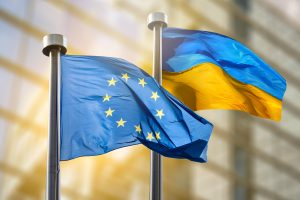Ukrainian President Volodymyr Zelenskyy is seeking to establish English as one of several international languages of communication in Ukraine. The plan is to pass legislation regulating the use of English in the country and enforce a mandatory level of proficiency for specific official positions. Guidelines for the usage of English would also be implemented across certain governmental and commercial sectors.

Draft law 9432 “On the use of the English language in Ukraine,” introduced to the Ukrainian Parliament on June 28, aims to determine which jobs/positions require knowledge of English to further boost international relations. Long term, it also aims to regulate and standardize the use of English in state and local governments, including in the Autonomous Republic of Crimea, as well as for emergency services, signage, border crossings, education, culture, transport, and healthcare.
“The transformation of the status of the English language in Ukraine is a necessity and a strategic step towards full membership of our country in the European Union, because knowledge of English is a key requirement for globalization and change,” the bill’s explanatory introduction reads.
It adds, “Adoption of this Law will contribute to the mastering of the English language by Ukrainian citizens, to the integration of Ukrainians into the European community, to Ukraine’s process of globalization, and to increasing its level of competitiveness, as well as the growth of investment and tourism.”
The draft also outlines provisions that would be required to bring English-medium roles up to date.
If the Ukrainian parliament passes the bill, English proficiency will become mandatory for heads of local administrations and their deputies, military officers, middle and senior police officers, prosecutors, tax and customs officials, heads of state-owned enterprises, and civil servants.
The Ministry of Education and science will offer free language tests to assess levels of proficiency for applicants to these roles.
The move to push English in Ukraine comes amid the ongoing invasion from Russia which has led to a rejection of Russian. Under the rule of the Tsars and for much of the 19th and 20th Centuries, Russian was widely used in Ukraine as a language of communication, particularly in Eastern border cities such as Kharkiv. In some of these cities, the Ukrainian language was suppressed and was even viewed as the language of uneducated people, or angled to represent political rebellion.
Since the collapse of the Soviet Union in 1991, Ukrainian census data has shown a rise in native Ukrainian speakers, making up a consistent majority – although many Ukrainians are proficient in Russian and consider themselves bilingual.
Over the last decade, particularly since Russia’s unrecognized takeover of Crimea, Luhansk, and Donetsk regions, many ethnic Ukrainians have chosen to stop speaking Russian. Since the Russian invasion of Ukraine, this rejection has increased.
Research conducted by Volodymyr Kulyk, head research fellow at the Institute of Political and Ethnic Studies at Ukraine’s National Academy of Sciences, shows that in 2012, only about 10% of the population in southern and eastern Ukraine spoke Ukrainian as their language of convenience, this rose to more than 70% in 2022.
“The act of choosing is linguistically significant but also politically significant. Before the 2022 invasion, most people in the east and south of Ukraine preferred Russian and saw no problem in being seen as people preferring Russian. Now they are understanding it is the wrong thing to do, and they don’t want to be speaking Russian to a stranger,” Kulyk told the Guardian.
For many Ukrainians, being part of the fastest linguistic shift in the country’s history is an act of resistance.







